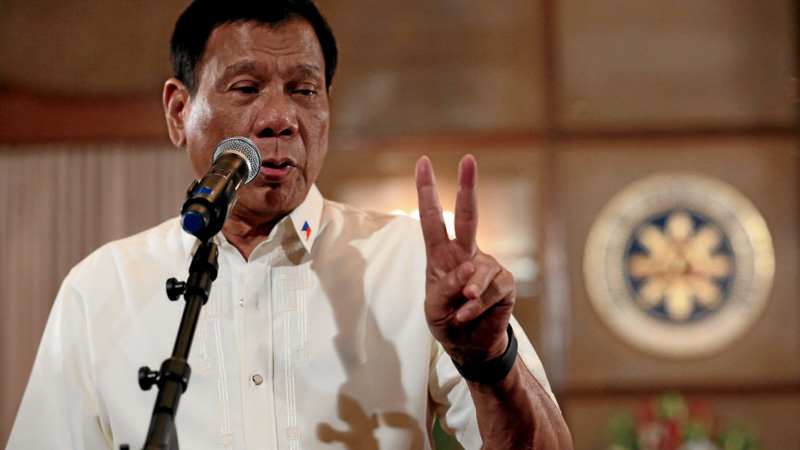President: Road to peace will be rocky
PRESIDENT Duterte on Monday acknowledged a “rocky road” to peace but held out hope communist rebels would continue the search for an end to a conflict that had torn the country for nearly half a century.
Mr. Duterte sounded optimistic in an interview with reporters a day after government and communist negotiators issued statements stepping back from the brink after the collapse last week of his unilateral ceasefire declaration following the insurgents’ failure to reciprocate.
His peace adviser, Jesus Dureza, and Communist Party of the Philippines (CPP) founding chair Jose Maria Sison, in statements to the press at the weekend, expressed hopes that a ceasefire could be negotiated at the resumption of peace talks in Oslo next month.
“Along the way, it’s always a rocky road. There is no negotiation that comes easy to us given the turmoil of our country,” Mr. Duterte said before he led a mass oath-taking of new appointees.
‘Despicable thought’
Article continues after this advertisementHe said he was hoping to talk again with the negotiators. “Maybe we did not understand each other,” he said, “and so the best is really to talk again and find out whether it is reachable or beyond our reach.”
Article continues after this advertisementThe cost of fighting with each other and knowing that bullets from the government would kill fellow Filipinos is a “despicable thought,” the President said.
“My desire is just to see my nation at peace and for everybody in this generation before I make my exit,” he said.
Mr. Duterte’s remarks came after he lifted on Saturday the unilateral ceasefire he announced on July 25 in his State of the Nation Address (Sona) when the National Democratic Front of the Philippines (NDFP), the political wing of the CPP and its armed group, the New People’s Army (NPA), failed to meet his ultimatum to announce a similar gesture.
The President was also distressed by the NPA attack on government troops in Kapalong, Davao del Norte province, two days after his truce declaration.
The NPA has said the attack was to preempt a military offensive against them, while the 77-year-old Sison, who founded the CPP in 1968, castigated Mr. Duterte, his former student, for being “volatile” and a “butangero” (hoodlum).
By week’s end, the Armed Forces of the Philippines and the Philippine National Police rescinded directives to troops to suspend operations and ordered them to resume their normal tasks to secure the nation from the NPA, whose strength has been dramatically reduced from a peak of 25,000 during the martial law years to around 4,000 now, according to the military.
Asked on Monday during the Palace news conference if he would reinstate the government ceasefire, Mr. Duterte said he would wait for the recommendation of his advisers.
He said he could not be an “ideological poltergeist”—a ghost making noises.
“I can only go along, coast along and get the advice of the people whom I have tasked. I cannot run my own errands. I have to do serious work here,” he said in his first meeting with Palace reporters since he assumed the presidency.
“Whatever advice they will give me, I will think about it, sleep on it. Perhaps then I will make a decision,” he added.
He also said he could not be “foul-mouthed” because he was talking for the Republic of the Philippines.
But he noted that it was the government that lost a soldier to an NPA attack, which was why he was wondering why he was being made out to be the bad guy.
The President also pointed out that he won by 16 million votes, while the communists had not been that successful in attempts to land elective office.
Little time to consult
In a Facebook chat with the Inquirer, Fidel Agcaoili, the NDFP spokesperson based in the Netherlands, blamed Mr. Duterte for the collapse of the ceasefire.
“He declared a unilateral ceasefire without giving us any details, even though we had been asking his negotiators to provide us with a copy should he decide to declare one during the Sona so that we can reciprocate,” Agcaoili said.
“The least he should have done was to give us more time, since we have been giving them more time to do what they are expected to do under the Oslo Joint Agreement of 15 June 2016,” he said.
He also pointed out that the NDFP negotiators in the Netherlands had to consult and seek approval of the CPP leadership on the ground before it could reciprocate Mr. Duterte’s truce declaration—a process that takes time.
Despite the setback, Agcaoili said the movement was optimistic that the Duterte administration would not just end hostilities but, most importantly, address crucial socioeconomic and political issues behind one of the world’s longest communist insurgencies.
Magdalo Rep. Gary Alejano said division among the factions loyal to Sison on one hand and CPP Central Committee leaders Benito and Wilma Tiamzon on the other was part of the reason for the NDFP’s failure to reciprocate Mr. Duterte’s moves.
“There are cracks within the organization and the government should look at this dynamic. If the Tiamzons do not agree to the terms set by the President, then we have a problem,” Alejano told the Inquirer by phone.
The Tiamzons were the highest communist officials until they were arrested in a joint military and police operation in 2014. They are detained at Camp Crame. With reports from Nikko Dizon and Karlos Manlupig, Inquirer Mindanao
